#veterinary parasitology
Text
#Veterinary Diseases#Veterinary Epidemiology#Veterinary Medicine#Livestock Care#Small Animal Care#Veterinary Diagnostics#Veterinary Hospitals#Veterinary Microbiology#Veterinary Parasitology#Veterinary Pathology
0 notes
Text
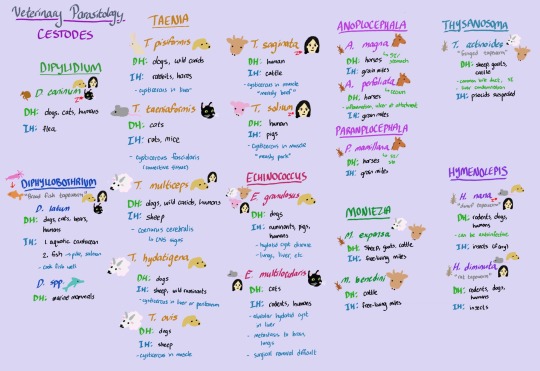
Cestodes aka Tapeworms
23 notes
·
View notes
Text

Fascioloides magna
#fascioloides magna#nature#liver flukes#trematodes#wikipedia#wikipedia pictures#animals#platyhelminthes#trematoda#plagiorchiida#fasciolidae#fascioloides#giant liver fluke#large american liver fluke#deer fluke#liver butterflies#parasites#parasitology#animal parasites#digenean trematode#veterinary medicine#veterinary science#vet med#medicalcore
18 notes
·
View notes
Text
Amebic Colitis Life Cycle

Patreon
#studyblr#notes#medblr#medical notes#med notes#parasites#parasitology#human parasitology#microbiology#microbio#microbio notes#microbiology notes#parasite notes#parasitology notes#biology#bio#biology notes#bio notes#life science#science#health science#medical science#pathology#pathophysiology#zoology#vetsci#veterinary science#amoebae#sciblr#note cards
8 notes
·
View notes
Text
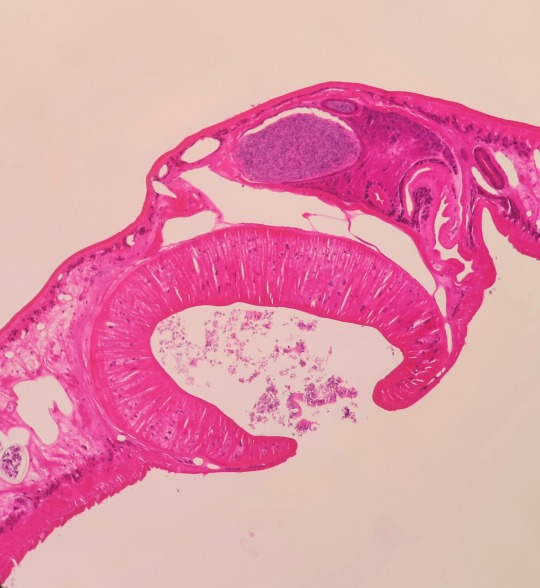
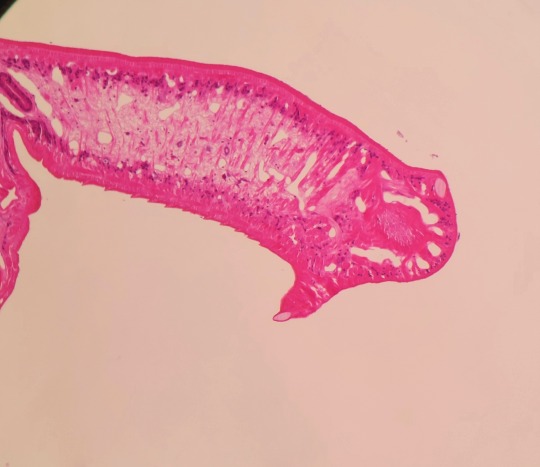
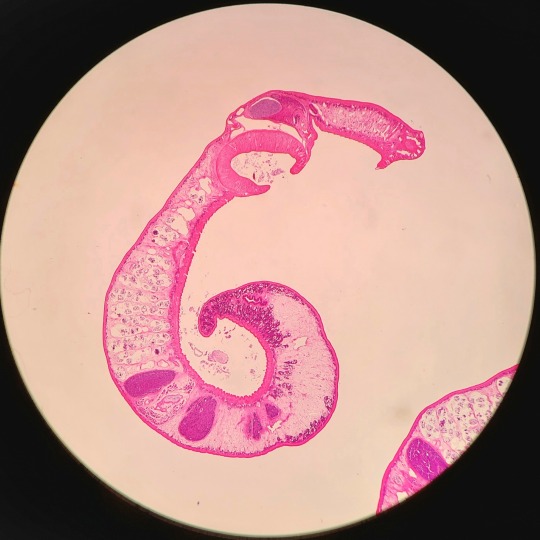
Found a gross lil friend in a ducks intestine and just wanted to share their little head claw, purple oatmeal brain, and massive fat mouth with everyone
63 notes
·
View notes
Text

#veterinary#vet tech#dermatology#diagnostic testing#lab testing#skin scrape#Demodex#parasitology#dog#cat#thedermvet
24 notes
·
View notes
Text
I met with some very cool people today to discuss their new research project about parasite-animal-human relationships, which hopes to touch on social and biological anthropology, primatology, veterinary medicine, human medicine and others. It's genuinely one of the most amazing projects I've heard about recently and I'm thrilled to (hopefully) be a part of it.
For my fellow scientists, please suggest your favorite books, research papers, anything really on the subject of parasites from any point of view!! I'd really appreciate it.
#parasitology#parasites#anthropology#social anthropology#biology#primates#primatology#physical anthropology#veterinary#vet med#medicine#multidisciplinary#science#nature#help a young scientist out please#academia#academics#the future is multidisciplinary#female scientists
3 notes
·
View notes
Photo

#artigo Impacto da urbanização sobre a fauna helmíntica em Alouatta, em 2 reservas biológicas, na região metropolitana de Porto Alegre - RS. Revista Agrária Acadêmica, v. 5, n. 3, p. 129-135, 2022. DOI 10.32406/v5n3/2022/129-135/agrariacad. ISSN 2595-3125 #ufrgs #parasitologia #parasito #parasitology #parasitologiaveterinária #alouatta #helminto #bugios #zoonose #medicina #medicinaveterinaria #veterinária #saudeanimal #agrárias #pesquisa #veterinarymedicine #veterinary #animal #agropecuaria #agrotecnologia #ciência #science #animais #doutorando #mestrado #existepesquisanobr #googlescholar (em Rio Grande do Sul) https://www.instagram.com/p/CmN83fTOXpD/?igshid=NGJjMDIxMWI=
#artigo#ufrgs#parasitologia#parasito#parasitology#parasitologiaveterinária#alouatta#helminto#bugios#zoonose#medicina#medicinaveterinaria#veterinária#saudeanimal#agrárias#pesquisa#veterinarymedicine#veterinary#animal#agropecuaria#agrotecnologia#ciência#science#animais#doutorando#mestrado#existepesquisanobr#googlescholar
0 notes
Note
do you know if there’s such a thing as veterinarians who work on invertebrates (other than honey bees)? Especially wild invertebrates in the context of wildlife rehab
Very cool question and I honestly wish I had a more knowledgeable answer for you. Unfortunately the field of veterinary medicine is a bit lacking when it comes to inverts. This is changing though! The Veterinary Invertebrate Society is growing in popularity and they’re currently trying to establish a journal to better disseminate information within the field.
My knowledge of caring for invertebrates medically is pretty much limited to one elective class in vet school that primarily focused on common pet inverts such as tarantulas. I did take a coral pathology course as well, and I know that is an area of invert medicine that is gaining more traction. We learn a lot about invertebrates in parasitology but not much about how to protect or care for them, obviously. I can’t say that I know off the top of my head of any great resources for exploring a career in veterinary care or rehabilitation of wild invertebrates. If conservation of wild inverts is your passion, it might be beneficial to explore both your invert of interest (entomology for example) and veterinary medicine to try and figure out where you fit best and maybe carve out a little niche between the two!
I’ve talked a bit about them before but the Archbold biological station is a great place to get in contact with people on the front lines of arthropod conservation- https://www.archbold-station.org/html/research/entom/entom.html
If any of my followers have more info about veterinary care in wild invertebrates I’d love to learn more about this topic too. Invertebrate conservation is an extremely important area of study and I’d definitely be interested to hear about how rehabilitation of wild animals fits into that!
115 notes
·
View notes
Text


borrower oc her name is Syrah like the alcohol…. she looks nervous all the time but she’s not she just looks like that (sorta, she is just extremely cautious and not good with expressions). Her hobbies include reading old discarded veterinary and parasitology textbooks, staring at squirrels from afar, and touching random fabrics while softly gasping in awe. Also she likes snatching buttons, orange ones to be exact cuz that’s her fav colour. She got a cool older bro named Zinfandel but I haven’t designed him yet.
7 notes
·
View notes
Text
Love how everyone in the veterinary community just accepts how much Horses want to die. I’m telling y’all these big stupid creatures can die from the smallest thing, the smallest inconvenience can send them galloping into the sweet embrace of death.
My parasitology lecture started today with the professor saying, “we all know how horses like to die. Sorry, to my horse people in here, but it’s true- they just love to colic and die.”
#horses always be like that meme of the old man#the guess I’ll die meme#rantings of a future dogtor#january 2023
10 notes
·
View notes
Text

Blood Cell Parasites
9 notes
·
View notes
Note
Hi sorry for bothering but idk if this got lost in the reblogs and i wanna know if it was of use but here are two links of the book you were looking for (for the first one i think it gives a free trial to download and then just cancel it lol)
https://pdfpremiumfree.com/downloads/veterinary-clinical-parasitology-seventh-edition/
https://vetbooks.ir/elseviers-veterinary-assisting-textbook-3rd-edition/
UR A LIFE SAVER!!!!!!!! i totally forgot to check back in the notes so thank u so so so much!!!
3 notes
·
View notes
Text
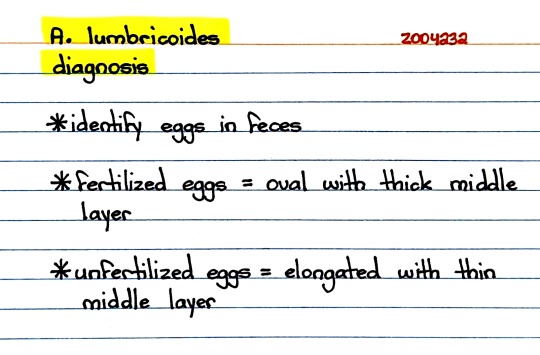
Patreon
#studyblr#notes#medblr#medical notes#med notes#parasites#parasitology#human parasitology#microbiology#microbio#microbio notes#microbiology notes#parasite notes#parasitology notes#biology#bio#biology notes#bio notes#life science#science#health science#medical science#pathology#pathophysiology#zoology#vetsci#veterinary science#amoebae#sciblr
10 notes
·
View notes
Text
Trends in canine heartworm resistance
New Post has been published on https://petn.ws/mH9N8
Trends in canine heartworm resistance
Cases of heartworm disease have continued to increase in both number and geographical location throughout the United States in the last few years, according to the Companion Animal Parasite Council (CAPC). Cassan N. Pulaski, DVM, MPH, PhD, clinical assistant professor and director of the diagnostic parasitology lab at the University of Georgia College of Veterinary […]
See full article at https://petn.ws/mH9N8
#DogNews
0 notes
Text
How to protect your pets from mites
If you are concerned that your dog is constantly itching itself, it’s best to dig deeper because that’s where the problem lies, says Dr Mukulesh Gatne, retired professor, department of parasitology, Bombay Veterinary College. “There is a possibility that your pet has been suffering from mites, leading to a disease called mange. Simply put, mites are microscopic, eight-legged parasites (arthropods) that can be found living on the skin of companion animals like dogs and cats, and sometimes, humans,” he explains.
Managing mange
Transmission to humans
Treatment is possible
If you live or have contact with an animal with mange, it is advisable that you treat yourself and the animal for mites. The cycle of mites and mange will not stop until you get the condition treated for yourself, family members, pets, and friends with whom you and your pets have regular physical contact. In addition, it is necessary to seek advice from your veterinarian for management of mange and to help prevent its spread.


#PetCare #PetHealth #Mites #PetItch
#the magnus protocol#dimension 20#taylor swift#dungeon meshi#the sunshine court#critical role#watcher#yuri on ice#transformers one#hades 2
0 notes